November 12, 2014
Edited by David Sanders
Specimen Days
1511 – Janus Secundus, neo latin poet (Basia), is born.
1556 – Giovanni della Casa, Italian poet (b. 1504), dies.
1779 – Adam Gottlob Oehlenschläger, Danish poet (d. 1850), is born.
1877 – René de Clerq, Flemish poet/author (Emergency Horn), is born.
1878 – Leopold Staff, Polish poet (d. 1957), is born.
1910 – Norman MacCaig, poet, is born.
1962 – Manuel Galvez, Argentina writer/poet (Hombres & Soledad), dies at 80.

Foundations
I built on the sand
And it tumbled down,
I built on a rock
And it tumbled down.
Now when I build, I shall begin
With the smoke from the chimney.
—Leopold Staff (1878–1957)
Now when I build, I shall begin / With the smoke from the chimney. —Leopold Staff (1878–1957)
World Poetry
Iraqis Mourn Death of Poet Who Fought ISIS

Iraqis on social media mourned the death of renowned poet Ali Rashm, who was reportedly killed fighting against the Islamic State of Iraq and Syria (ISIS) extremist group. On his official Facebook page, which has more than 10,000 likes, Rashm’s fans expressed sorrow of the 26-year-old’s “martyrdom.”
Day of the Imprisoned Writer: Mahvash Sabet

Teacher and poet Mahvash Sabet is currently serving a 20-year prison sentence in Evin prison, Tehran. She is one of a group of seven Baha’i leaders known as the “Yaran-i-Iran” – “Friends of Iran” – who have been detained since 2008 for their faith and activities related to running the affairs of the Bahá’í community in Iran. Mahvash Sabet began writing poetry in prison, and a collection of her prison poems was published in English translation on 1 April 2013. PEN International is calling on the Iranian authorities to release Mahvash Sabet and all other writers imprisoned in Iran solely for exercising their right to legitimate freedom of expression.
After Suicide, Foxconn Worker's Poems Strike a Chord
Poems from a young worker at Foxconn Technology Co. who committed suicide have opened a rare window into the mundane and grueling work on China’s factory floors. Xu Lizhi, a 24-year-old with literary aspirations, had worked on and off on assembly lines since 2010 to support himself, according to the Shenzhen Evening News. The report said that after he committed suicide by jumping off a building onSept. 30, his friends helped gather his poems and republished them in the local newspaper (In Chinese).
Iraqis mourned the death of renowned poet Ali Rashm, who was reportedly killed fighting against ISIS.
Recent Reviews
On Poetry: Frost’s Early Letters Overturn an Unfavorable Biography
by Sydney Lea
I recently composed an essay on the early letters of Robert Frost for the excellent Georgia Review. In the process, any number of things occurred to me, including — and I have thought on this for some time — that this sort of volume will be unavailable to future readers, who may be interested in our own day’s authors, poets or otherwise. Such writers’correspondence, like my own, is all but exclusively electronic, and whatever its other undeniable virtues, that mode of communication lends itself poorly to the sort of artful construction everywhere obvious in the Frost book I considered.
Paper Aeroplane: Selected Poems 1989–2014 by Simon Armitage review – ‘What surprises is how urgent and contemporary his early poems still read’
by Ben Wilkinson
“How did it get so late?” wonders Simon Armitage in Paper Aeroplane, his new selected poems. It’s a fair question. The recent fanfare of the Next Generation Poets 2014, a promotion touting fresh voices set to dominate British verse, has coincided with Armitage, once poetry’s poster boy for the original New Generation Poets 1994, releasing this hefty retrospective. Twenty-five years have passed since he stunned the poetry world with his debut Zoom! (1989), his voice distinctive, his energetic style fully formed. Since then there have been: 10 book-length collections, a host of novels, plays, translations and memoirs, not to mention a clutch of TV and radio programmes. What surprises is how urgent and contemporary those early poems still read.
Walking Through Light-Filled Rooms In 'Woman Without A Country'
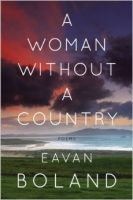
by Amal El-Mohtar
I've said before that a good collection of poetry — unlike, say, a good novel, or a good short story — is tricky to talk about. If I love a novel, I'll describe the plot, maybe compare it to the writing of others, talk about the successes and failures of its craft. Poetry collections, though — I just want to read portions out to people, make them feel what I felt, show them concretely the details over which I marveled.
Sor Juana: Mexico’s Most Erotic Poet and Its Most Dangerous Nun
by Katie Baker
She was a woman who’d be extraordinary in any century. A look at the new translation of the works of Sor Juana Inés de la Cruz. Who was the most erotic poet of the late Renaissance and early Baroque, when the quatrain reached its courtly zenith? Was it Sir Thomas Wyatt, who penned lines sick with longing—“Whoso list to hunt, I know where is an hind/But as for me,hélas, I may no more”—for his former paramour Anne Boleyn? Was it Shakespeare, in mad pursuit of a lovely boy and that voluptuous Dark Lady? Or was it the poet who wrote this phrase (so erogenous, so suggestive): “I shall not play the slenderness/Of your fine, exquisite torso/For the bend of your waist is as/Troubling as a trill in the song”?
Thirteen Poets Recommend New & Recent Titles
by Ron Slate
Welcome to The Seawall’s semi-annual poetry feature. This season, thirteen poets write briefly on some of their favorite new and recent titles.
I just want to read portions out to people, make them feel what I felt. –Amal El-Mohtar
Broadsides
The Rap on Old Age: Not a Young Man’s Game

by J. C. Barden
A few days past my 79th birthday, I am sitting in a packed house of poets and their followers at the Nuyorican Poets Cafe in the East Village, nervously waiting to compete in a slam against people who are mostly decades younger. I have no chance of winning. My poem and performance will have to be incredibly strong for me to achieve my realistic goal: making the championship round of five.
Wendy Cope Interview: ‘You know, there’s some sadness in me’

by Rivka Isaacson
If a general published his memoirs,” says Wendy Cope, “it solved the problem of what to get my father for Christmas.”Life, Love and The Archers, the first book-length prose offering from this well-loved poet will, no doubt, serve the same purpose for many a stocking this festive season. Over the years Cope has written numerous prose pieces on a variety of topics; education, romance, religion, television, psychoanalysis; and has long had the idea of collating them into a book. This came to fruition when a proactive editor, Lisa Highton, waded through the Wendy Cope archive at the British Library looking for suitable material. She turned up fascinating stuff, some of which came as a surprise to the author herself, who had no recollection of writing it. This is perhaps a symptom of the ageing process, another of Cope’s favoured subjects. The resulting collection is entertaining and moving, with appeal far beyond stalwart Cope fans.
What Should We Do about Radovan Karadžić’s Poetry?
by Heather McRobie
Tackling literary hate speech, which is often coded and implicit, requires we find solutions beyond censorship, whilst properly acknowledging and mitigating against the real damage hate speech causes. In April 2009, PEN Slovakia, an organisation which campaigns on behalf of persecuted writers and in favour of free expression, issued a statementcondemning the publication in a Slovakian journal of a poem by Radovan Karadžić. One important facet of any understanding of literary freedom is the concept of the limits, which are framed in terms of ‘hate speech’. Addressing the question of whether PEN Slovakia's condemnation of the publication of Karadžić's poetry contradicts its self-declared standpoint on freedom of literary expression, is a lens through which to demonstrate the inadequacies of the traditional approach to freedom of expression, with its emphasis on ‘striking a balance’ between freedom of expression and harm caused by hate-speech. The capabilities approach – developed by Amartya Sen and Martha Nussbaum, and which Katherine Gelber has applied to hate speech – provides a more effective remedy to this ongoing dilemma.
After his 79th birthday, J. C. Barden competes at Nuyorican Poets Cafe against people who are decades younger.
Drafts & Fragments
Colorful Mural in Italy Celebrates 20th Century Poet Alfonso Gatto
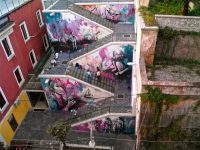
Rome-based visual artist Alice Pasquini recently completed an extensive mural project which celebrates the life and work of Italian poet Alfonso Gatto. Pasquini was commissioned by the Fondazione Alfonso Gatto to create the work in the city of Salerno, where the poet was born.
New mural project celebrates the life and work of Alfonso Gatto.
Poetry In the News
1,000-Year-Old Tomb Reveals Murals, Stars & Poetry
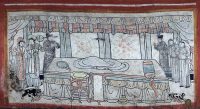
A 1,000-year-old tomb with a ceiling decorated with stars and constellations has been discovered in northern China. Found not far from a modern day railway station, the circular tomb has no human remains but instead has murals which show vivid scenes of life.
A 1,000-year-old tomb with a ceiling decorated with stars and constellations has been discovered in northern China.
New Books
Terrapin: Poems by Wendell Berry 
[Hardcover] Counterpoint, 80 pp., $25.00
Tom Pohrt spent years gathering those poems of Wendell Berry’s he imagined children might read and appreciate, making sketches to accompany his selection. Over the past several years a dialogue has evolved in which the poet has come to advise the illustrator on the natural history of the animals and plants seen so intimately in the poems. Then came the august book designer Dave Bullen, who has been designing the books of Wendell Berry for more than thirty years. The resulting volume of 21 poems includes dozens of the sketches, drawings and watercolors in what amounts to a visual meditation on the poem they work to illustrate and is simply staggering in both its beauty and its meaning to those of us who remain lovers of the book as physical object.
The Hiss of the Viper by Carmelia Leonte
[Paperback] Carnegie Mellon, 72 pp., $16.95
Carmelia Leonte’s voice, sharp and beautifully quirky, strikes singular notes in the Romanian and Eastern European poetic landscape.
Malaria, Poems by Cameron Conaway
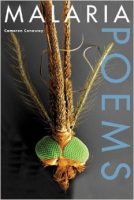
[Paperback] Michigan State University Press, 80 pp., $16.95
Malaria kills nearly one million people each year. Hundreds of millions more are sickened by the disease, and many of them are permanently disabled. Billions are spent each year to understand it. Researchers know the molecular details of the interaction between the mosquito and our own red blood cells, and the myriad ways in which malaria impacts the global economy and the advancement of humanity. But what of the public? Though its story is told in thousands of articles and in hundreds of books, many in the developed world are unaware of how prevalent malaria still is. Malaria, Poems testifies to the importance of bridging the chasm between science and art.
A Woman Without a Country: Poems by Eavan Boland
[Hardcover] W. W. Norton & Company, 96 pp., $24.95
A powerful work that examines how—even without country or settled identity—a legacy of love can endure. Eavan Boland is considered “one of the finest and boldest poets of the last half century” by Poetry Review. This stunning new collection, A Woman Without a Country, looks at how we construct one another and how nationhood and history can weave through, reflect, and define the life of an individual. Themes of mother, daughter, and generation echo throughout these extraordinary poems, as they examine how—even without country or settled identity—a legacy of love can endure.
Approaching the Gate: Poems by Lynette Reini-Grandell

[Paperback] Holy Cow! Press, 72 pp., $15.00
Lynette Reini-Grandell's long-anticipated debut collection of poetry quickens with forward movement, be it in a car that pushes towards the stars—or with a horse that suddenly spooks, leaving the speaker "knocked down, / breathless, / turning to the sight of a thousand-pound horse / rushing the gate / and leaping over my head." Several of the poems probe the experience of her grandparents who emigrated from Finland and settled on a farm in northern Minnesota in the early twentieth century. The urge to move forward is matched with a deep love and reverence for creatures living in their natural world, for the buzz of the city, for unmet ancestors and kindred spirits, and most especially for her transgender husband.
Terrapin includes dozens of the sketches, drawings and watercolors and is simply staggering in both its beauty and its meaning.
Correspondences
Searching for Nicanor
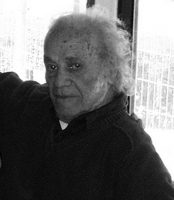
by Leila Guerriero
He’s a man, but he could be something else: a catastrophe, a roar, the wind. He sits in an armchair covered by a blanket. He wears a denim shirt, a beige sweater with several holes, corduroy pants. Behind him, a sliding door separates the living room from a balcony with two chairs. Beyond, a lot covered in plants and shrubs. Then the Pacific Ocean, waves biting at rocks like black hearts.
Poetry in Translation: A Conversation with Kätlin Kaldmaa

by Julie R. Enszer
Kätlin Kaldmaa is an Estonian poet, writer, translator and literary critic. She has published four collections of poetry, two books for children, an autobiographical work of non-fiction, and a novel. She has translated over 40 books into Estonian by authors such as Jeanette Winterson, Aphra Behn, Michael Ondaatje, Ali Smith, Goran Simić and Gabriel García Márquez. Her own poems have been translated into Arabic, English, Finnish, French, Galician, German, Korean, Latin, Japanese, Russian, Slovenian, Spanish and Turkish. She is the President of Estonian PEN.
Interview with Poet Diane di Prima
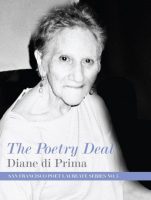
by Jonah Raskin
Diane di Prima has been writing poetry in San Francisco ever since the summer of 1968, when she arrived from New York. At 80, she continues to write newsy, visionary poetry. This month City Lights is publishing “The Poetry Deal,” a valentine for her adopted city and its citizens. If Jack Kerouac was the King of the Beats, di Prima is the queen, though she’s too much of a populist to wear a crown, and, as the mother of five children and four grandchildren, she’s rarely enjoyed the privileges accorded royalty. In 2009, at her inauguration as the city’s poet laureate, she told a packed house at Koret Auditorium that she first knew San Francisco as a magical place. That magic carried her from the days of the Grateful Dead to the era of the AIDS epidemic, and from boom to bust to the Google buses. In her little house in the Excelsior, where she lives with her husband, and which bulges with books, tapes, photographs and manuscripts, she writes, meditates and meets friends old and new.
Derrick Brown Heals a Horse and Puts It to Verse

by Anna Christiansen
A former paratrooper for the 82nd Airborne, Derrick Brown won the 2013 Texas Award for his poetic play “Strange Light.” His newest collection of poetry is called “Our Poison Horse.” When poet Derrick Brown moved from the city of Austin to more rural Elgin, Texas, he was searching for “a peaceful plot of land to hunker down.” The pastoral surroundings, as well as the cycle of life he observed around him — like “the birds waiting for carcasses,” he says — enabled Brown to slow down and regain his voice. Brown, who comes from a similarly rural Texas community, told Art Beat that “everything my father wished I was started to hit me: growing food, building fences, riding tractors.”
He’s a man, but he could be something else: a catastrophe, a roar, the wind.
Envoi: Editor’s Notes
Lessons from the Past: Joseph Brodsky

If a poet has any obligation toward society, it is to write well. Being in the minority, he has no other choice. Failing this duty, he sinks into oblivion. Society, on the other hand, has no obligation toward the poet. A majority by definition, society thinks of itself as having other options than reading verses, no matter how well written. Its failure to do so results in its sinking to that level of locution at which society falls easy prey to a demagogue or a tyrant. This is society's own equivalent of oblivion.
—from "To Please A Shadow" in Less Than One: Selected Essays
“If a poet has any obligation toward society, it is to write well.”
—from “To Please A Shadow” in Less Than One: Selected Essays